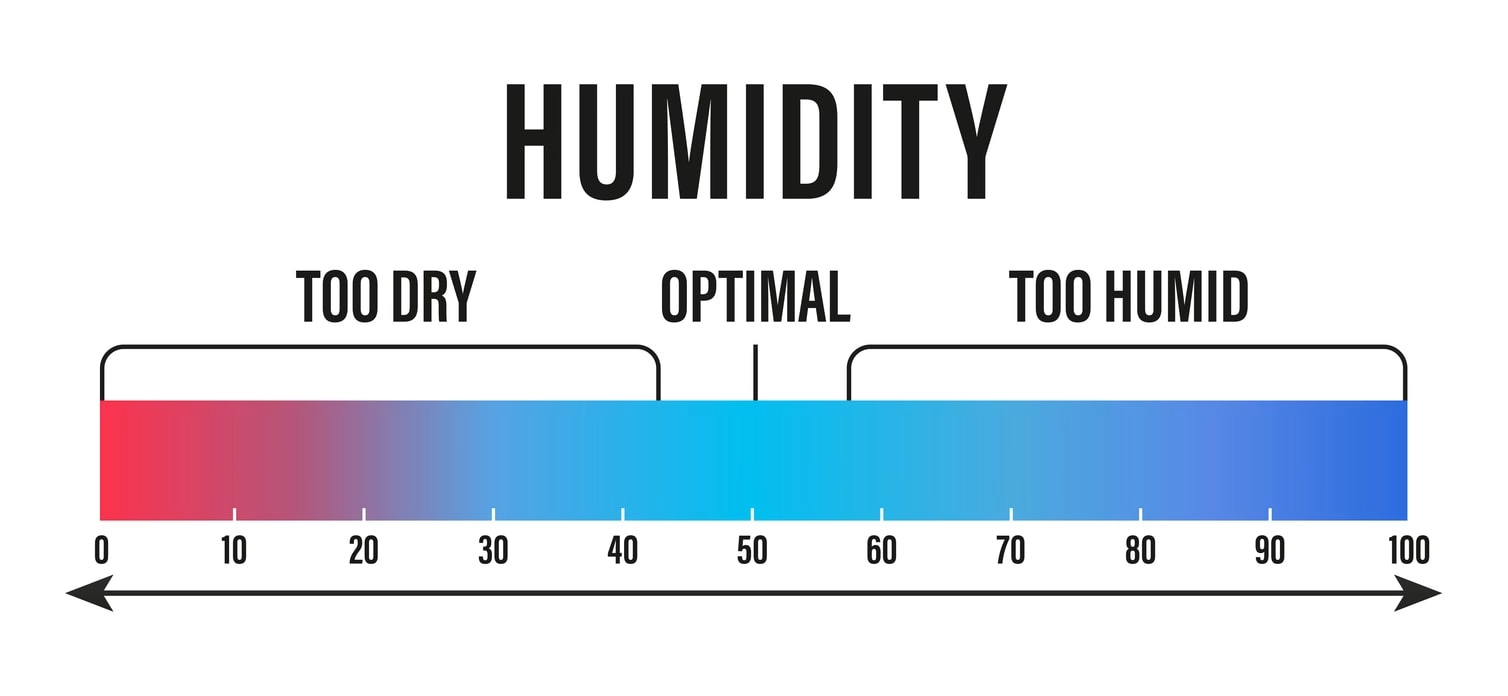Living in Florida means enjoying the sunshine and warmth, but also withstanding its notorious humidity levels. For homeowners, managing indoor comfort becomes a year-round challenge. The question often arises: Does humidity impact my AC unit? Understanding the effects of humidity on cooling efficiency is crucial for optimizing Heating, Ventilation, and Air Conditioning (HVAC) performance in this unique climate. While many homeowners focus solely on temperature control, the moisture content in the air can significantly impact the cooling capacity, energy efficiency, and overall lifespan of your HVAC equipment. By understanding the relationship between humidity and your AC unit, you can take proactive steps to enhance indoor comfort, reduce utility costs, and extend the longevity of your cooling system.
What is Humidity?
Humidity refers to the amount of moisture or water vapor present in the air around us. It’s what makes the air feel sticky or damp on hot summer days and affects how we perceive temperature and comfort indoors. Understanding humidity is important, especially when considering how it can impact the effectiveness of cooling systems like air conditioners. High humidity levels can make it harder for our bodies to cool down naturally through sweating, thereby increasing our dependence on air conditioning to maintain comfort.

7 Ways High Humidity Can Disrupt Your AC’s Efficiency
Your air conditioner’s primary function is to not only lower the temperature but also remove excess moisture from the air. This dual-purpose operation is essential for creating a comfortable living environment. However, when the humidity levels are excessively high, your AC system may struggle to keep up, leading to various performance issues. While humidity can disrupt your AC unit in various ways, seven common factors include:
1. Humidity’s Impact on Cooling Capacity
High moisture content in the air can diminish the cooling effect of your AC unit. When the air is saturated with water vapor, it becomes more difficult for your body to cool itself through perspiration. As a result, the indoor space may feel warmer and more oppressive, even if the temperature reading is within the desired range. This occurs because the humid air slows down the evaporation of sweat from your skin, a natural cooling mechanism.
2. Uneven Cooling and Inconsistent Comfort
Excessive humidity can also lead to uneven cooling throughout your home. While some areas may feel relatively comfortable, others may remain stuffy and damp. This is often due to the AC unit’s inability to effectively dehumidify the air, causing it to focus more on temperature reduction in certain zones while neglecting moisture removal in others.

3. Increased Energy Consumption
In an effort to compensate for the high humidity levels, your AC system may need to run for longer periods or at higher capacities to achieve the desired cooling effect. This increased workload translates to higher energy consumption, resulting in a spike in your utility bills. Homeowners may find themselves continuously adjusting the thermostat to no avail, as the system struggles to maintain a comfortable indoor environment.
4. Potential Damage to the AC System
Beyond the immediate comfort and efficiency concerns, high humidity can also have long-term consequences on the health and longevity of your air conditioning unit.
5. Strain on Internal Components
The excess moisture in the air places additional strain on the various components of your AC system, including the compressor, coils, and fans. As the unit works harder to remove the humidity, it experiences accelerated wear and tear, leading to a shorter overall lifespan.
6. Mold and Mildew Growth
Excessive humidity creates the perfect breeding ground for mold and mildew, which can accumulate within the ductwork, on the evaporator coils, and in other hidden areas of the system. These biological contaminants not only compromise indoor air quality but can also contribute to the corrosion and degradation of critical AC parts.
7. Frozen Evaporator Coils
Another potential issue caused by high humidity is the freezing of the evaporator coils. When the moisture in the air condenses on the cold coils, it can lead to the formation of ice, restricting airflow and disrupting the cooling process. This can result in system malfunctions and the need for costly repairs.
Proactive Humidity Control for Year-Round Comfort
Fortunately, there are several strategies you can employ to mitigate the negative impacts of humidity on your air conditioning system and maintain a comfortable indoor environment. Ensuring that your AC unit is correctly sized for your home’s cooling and dehumidification needs is crucial; an oversized system can cool too quickly, failing to remove moisture adequately, while an undersized unit may struggle to meet cooling demands. Integrating a whole-home dehumidifier with your HVAC system effectively controls humidity levels, enhancing comfort and efficiency. Regular maintenance, such as changing air filters and cleaning coils, prevents humidity-related issues and ensures optimal performance. Improving airflow and ventilation by sealing leaks, optimizing ductwork, and using exhaust fans in moisture-prone areas like bathrooms and kitchens also helps manage indoor humidity effectively.

Contact Us
Understanding the impact of humidity on your air conditioning system and implementing appropriate strategies can enhance your home’s comfort, energy efficiency, and system longevity. By recognizing the various ways in which excess moisture can affect your cooling equipment, you can take proactive steps to mitigate these challenges and create a more comfortable and well-maintained indoor environment. From proper system sizing to dehumidifier integration, there are numerous strategies available to help you manage humidity and ensure your AC unit operates at its best. Proactively managing humidity not only improves AC efficiency but also reduces energy costs and extends HVAC lifespan. At Progressive Air, we’re dedicated to helping you control humidity and enhance your AC unit for year-round comfort and efficiency. Contact us today to resolve humidity concerns, optimize your AC unit, and begin enjoying a more comfortable home environment.

